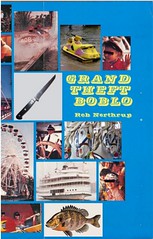In space, no one can hear you fail the Bechdel Test
I watched Outland yesterday, which was good in some ways, weak in others. I had watched Alien just a week or two ago, and the visuals and tone are very similar. Blade Runner seems visually similar to the other two (well, duh, directed by the same guy who did Alien). Lots of shadows and smoke, and lots of fluorescent lights.
It occurred to me that all three of these have something else in common: mining planets or asteroids. The Alien crew is towing a cargo of ore back to Earth, Outland is set in a mining outpost on one of the moons of Jupiter. Blade Runner deals with the post-traumatic stress of miners who can't integrate into Earth society when they come back. Or robots or whatever, close enough.
Another thing no one can do in space is stop prostitution, apparently. Alien has a little bit of what we'd call sexual harassment between crew members. Outland and Blade Runner explicitly talk about prostitutes and "basic pleasure model" skin jobs for the miners.
I'm poking around Amazon to find similar movies from this era, "Customers Who Viewed This Also Viewed..." Does The Thing (1982) fit with these other fluorescent noir films? It's not as moody as something by Ridley Scott, but you have shots of a camera moving down empty hallways in The Thing, similar to the opening shots of Alien. None of them have conventionally happy endings. Outland shows the hero solve some lower-level crimes, but doesn't address whether he stops the systematic corporate corruption.
The Thing doesn't have horny miners in space, but they're far away from home in a hostile environment. And the cast is all male. They might all fail the Bechdel Test. If Alien passes the Bechedel Test, it's probably a scene where Ripley and Lambert discuss the alien threat (or I might be thinking of a deleted scene).
Other possible candidates for Fluorescent Noir:
Silent Running (1972)
THX 1138 (1971)
?
It occurred to me that all three of these have something else in common: mining planets or asteroids. The Alien crew is towing a cargo of ore back to Earth, Outland is set in a mining outpost on one of the moons of Jupiter. Blade Runner deals with the post-traumatic stress of miners who can't integrate into Earth society when they come back. Or robots or whatever, close enough.
Another thing no one can do in space is stop prostitution, apparently. Alien has a little bit of what we'd call sexual harassment between crew members. Outland and Blade Runner explicitly talk about prostitutes and "basic pleasure model" skin jobs for the miners.
I'm poking around Amazon to find similar movies from this era, "Customers Who Viewed This Also Viewed..." Does The Thing (1982) fit with these other fluorescent noir films? It's not as moody as something by Ridley Scott, but you have shots of a camera moving down empty hallways in The Thing, similar to the opening shots of Alien. None of them have conventionally happy endings. Outland shows the hero solve some lower-level crimes, but doesn't address whether he stops the systematic corporate corruption.
The Thing doesn't have horny miners in space, but they're far away from home in a hostile environment. And the cast is all male. They might all fail the Bechdel Test. If Alien passes the Bechedel Test, it's probably a scene where Ripley and Lambert discuss the alien threat (or I might be thinking of a deleted scene).
Other possible candidates for Fluorescent Noir:
Silent Running (1972)
THX 1138 (1971)
?








